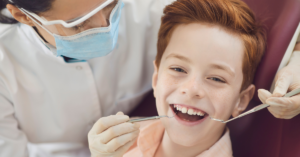Taking care of your teeth and gums is important at any age, but it becomes even more crucial as you get older. Maintaining good oral health in old age helps prevent problems like toothaches, tooth decay (cavities), and tooth loss. A healthy mouth also makes it easier for you to eat well and enjoy food. It’s especially important for elderly individuals to prioritize oral care if they have health conditions like diabetes or heart disease or if they’re taking medications that can cause oral health problems.
To keep your teeth and gums healthy as you age, it’s essential to follow a few simple steps. This includes brushing and flossing your teeth every day to remove dental plaque that can cause tooth decay and gum disease. Using fluoride toothpaste can also help strengthen your teeth and prevent cavities. Additionally, regular dental check-ups are crucial for early detection and prevention of oral health problems.
Key Takeaways:
- Good oral care is essential for maintaining oral health in old age.
- Regular dental check-ups are important for detecting and preventing oral health problems.
- Brush and floss your teeth every day to remove dental plaque.
- Use fluoride toothpaste to strengthen your teeth and prevent cavities.
- Oral care is especially important for seniors with health conditions or taking medication that can affect oral health.
The Impact of Oral Health on Overall Health and Quality of Life
Good oral health is essential for maintaining overall health and quality of life in aging individuals. As we age, dental disease becomes a common cause of medical and emergency room visits among older adults. The medications and chronic illnesses commonly found in this population, such as diabetes or heart disease, put seniors at a higher risk for dental problems.
By prioritizing senior dental care and maintaining good oral hygiene, it is possible to prevent common issues such as toothaches, gum disease, and tooth loss. This, in turn, promotes better nutrition and enhances the ability to enjoy food.
One of the key benefits of oral care for the elderly is the prevention of dental diseases that can impact overall health. Gum disease, for example, has been linked to an increased risk of heart disease, diabetes, and pneumonia. By preserving oral health, older adults can reduce the potential systemic health risks associated with poor oral hygiene.
Moreover, maintaining oral health in old age also contributes to an improved quality of life. Seniors who have healthy mouths can eat comfortably and fully enjoy their meals. This not only provides physical nourishment but also enhances the social and emotional aspects of eating, promoting overall well-being.
In summary, prioritizing oral health in aging individuals through senior dental care and good oral hygiene practices has numerous benefits. It helps prevent dental issues, improves overall health outcomes, and enhances the overall quality of life in the elderly.
Common Dental Challenges in the Elderly
As individuals age, they face specific dental challenges that can impact their oral health. Understanding these challenges and taking proactive measures is crucial for maintaining good oral hygiene and overall well-being in old age.
Higher Risk of Tooth Decay, Gum Disease, and Tooth Loss
The elderly are more susceptible to tooth decay, gum disease (gingivitis and periodontitis), and tooth loss due to various factors:
- Receding Gums: The gums naturally recede as we age, exposing the tooth roots and making them more vulnerable to decay and gum disease.
- Lack of Saliva: Many seniors experience dry mouth, a condition often caused by medications taken for various health conditions. Reduced saliva flow can lead to tooth decay as saliva plays a crucial role in rinsing away harmful bacteria.
- Weakened Immune System: Aging weakens the immune system, making it harder for the body to fight off infections and dental diseases.
- Root Decay: Exposed tooth roots due to receding gums are more prone to decay, especially if proper oral hygiene practices are not followed consistently.
Risk of Oral Cancer
The risk of oral cancer increases with age. It is essential for seniors to be aware of the signs and symptoms of oral cancer and undergo regular oral cancer screenings with their dentist to detect and address any abnormalities early.
Regular Dental Check-ups and Oral Hygiene Tips for the Elderly
To maintain oral health in old age, older adults should prioritize regular dental check-ups and follow these oral hygiene tips:
- Brush twice daily: Use a soft-bristled toothbrush and fluoride toothpaste to brush your teeth thoroughly for two minutes each time.
- Floss daily: Clean between your teeth and along the gumline using dental floss or interdental brushes to remove plaque and food particles.
- Use mouthwash: Rinse with an antimicrobial mouthwash to kill bacteria and freshen breath.
- Stay hydrated: Drink plenty of water throughout the day to help combat dry mouth.
- Limit sugary and acidic foods and drinks: These can contribute to tooth decay and erosion.
- Avoid tobacco products: Smoking and chewing tobacco increase the risk of gum disease, oral cancer, and tooth loss.
By adopting these habits and maintaining regular dental check-ups, older adults can overcome the dental challenges they face and enjoy good oral health in their golden years.
The Importance of Regular Dental Check-ups for Seniors
Regular dental check-ups play a crucial role in maintaining oral health for seniors. As we age, our oral health needs change, making routine dental visits essential for preventing and detecting oral health problems. These check-ups help identify issues early on, allowing for timely intervention and treatment.
Seniors should consult with their dentist to determine the frequency of visits tailored to their specific needs. While there is no set rule for how often older adults should see the dentist, it is generally recommended to have a check-up and cleaning every six months. However, individuals with certain medical conditions or those at higher risk for dental problems may require more frequent visits.
It’s important to note that Medicare generally does not cover most dental care expenses. Seniors may need to explore private dental insurance plans or seek low-cost dental care options to ensure they receive the necessary preventive and restorative dental treatments.
| Benefit of Regular Dental Check-ups for Seniors | Explanation |
|---|---|
| Early Detection of Oral Health Problems | Regular dental check-ups help identify dental issues such as gum disease, tooth decay, and oral infections at an early stage, increasing the chances of successful treatment and preventing further complications. |
| Preventive Care and Education | Dentists provide preventive treatments like dental cleanings, fluoride applications, and dental sealants to protect the teeth and gums from decay and disease. They also offer valuable oral health education, promoting good oral hygiene practices specific to seniors. |
| Maintaining Dental Function | Regular dental check-ups help address issues with dentures, oral prosthetics, and other dental appliances, ensuring they fit properly and function optimally for improved eating, speaking, and overall comfort. |
| Overall Health Monitoring | Dental professionals are often the first to detect oral signs and symptoms of underlying systemic health conditions, such as diabetes, cancer, cardiovascular disease, and osteoporosis, allowing for timely referral and intervention. |
By prioritizing regular dental check-ups, seniors can proactively maintain their oral health and enjoy a higher quality of life. These check-ups not only contribute to the preservation of teeth and gums but also promote better overall health outcomes.
Tips for Maintaining Good Oral Hygiene in the Elderly
Good oral hygiene habits are essential for maintaining oral health in old age. Here are some tips to help seniors maintain a healthy mouth:
- Brush and floss daily: Brush your teeth at least twice a day with fluoride toothpaste, and don’t forget to floss to remove plaque buildup between your teeth.
- Use special brushes or picks: If holding floss is difficult, consider using special brushes or floss picks designed for people with dexterity issues.
- Be vigilant for changes: Regularly examine your mouth for any changes, such as sores, red or swollen gums, or changes in the color or texture of your tongue. If you notice anything concerning, see a doctor or dentist for further evaluation.
- Eat a healthy diet: A balanced diet that includes plenty of fruits and vegetables can help promote good oral health. Avoid sugary snacks and drinks, as they can contribute to tooth decay.
- Avoid tobacco products: Tobacco use, including smoking and chewing tobacco, is harmful to oral health and can increase the risk of gum disease, oral cancer, and tooth loss.
- Drink alcohol in moderation: Excessive alcohol consumption can also have negative effects on oral health, so it’s important to drink in moderation.
By following these oral hygiene tips, elderly individuals can maintain good oral health and enjoy a better quality of life.
The Link Between Oral Health and Systemic Health
Poor oral health can have significant implications for the overall health of older adults. Conditions such as gum disease, tooth decay, and oral infections can increase the risk of developing various systemic health issues, including heart disease, diabetes, pneumonia, and other medical conditions. It is crucial for seniors to prioritize their oral health to manage these risks and improve their overall health outcomes.
“Oral health is not just about having a healthy smile, it is also linked to the well-being of the entire body. Maintaining good oral hygiene can go a long way in preventing various health problems and improving the quality of life for older adults.” – Dr. Emily Johnson, Chief Oral Health Officer at XYZ Dental Care
Research shows that poor oral health can have a profound impact on the general health of older individuals. Gum disease, in particular, has been associated with an increased risk of heart disease, as the bacteria from the infected gums can enter the bloodstream and affect the heart. Similarly, tooth decay and oral infections can contribute to the development or worsening of conditions such as diabetes and pneumonia.
By maintaining good oral hygiene and seeking regular dental care, seniors can effectively manage these risks and decrease the likelihood of developing systemic health issues. Proper brushing and flossing, along with routine dental check-ups and cleanings, are essential for preventing dental problems and reducing the risk of associated health complications.
How Oral Health Impacts Systemic Health
The table below highlights the relationship between oral health and systemic health in older adults:
| Oral Health Condition | Systemic Health Implications |
|---|---|
| Gum Disease | – Increased risk of heart disease – Higher likelihood of stroke – Worsening of diabetes symptoms |
| Tooth Decay | – Potential link to lung infections, such as pneumonia – Adverse effects on overall nutrition and well-being |
| Oral Infections | – Increased risk of systemic infections – Compromised immune system |
As the table illustrates, the state of oral health directly affects various aspects of systemic health in the aging population. Therefore, prioritizing oral care and seeking timely dental treatment is vital for maintaining overall health and improving the well-being of seniors.
Addressing Oral Health Issues in the Aging Population
The aging population faces unique oral health issues that require special attention. Maintaining oral health in old age is crucial for seniors’ overall well-being. However, there are several dental challenges that the elderly encounter, making it necessary to address these issues effectively.
“Access to dental care can be a challenge for seniors, as dental care benefits often cease upon retirement and routine dental care is not covered by Medicare.”
Seniors may experience a lack of access to dental care due to various factors. Transportation can be a barrier for older adults, especially those with limited mobility. Memory loss, cognitive problems, and physical disabilities can also make it difficult for seniors to seek regular dental check-ups and treatment. These challenges highlight the need to improve access to dental care for the aging population.
To promote oral health in the elderly, efforts should be made to provide better access to dental care services. This includes implementing policies that ensure dental care benefits continue beyond retirement and exploring options for affordable dental insurance for seniors. Additionally, initiatives aimed at educating older adults about the importance of oral health and providing resources for maintaining oral hygiene can play a crucial role in addressing dental challenges in the elderly.
Efforts to Improve Access to Dental Care for Seniors
Several measures can be taken to enhance access to dental care for the aging population:
- Expand dental care benefits for retirees: Develop policies that extend dental care benefits beyond retirement age, ensuring that seniors have access to necessary dental services.
- Establish geriatric dental clinics: Create specialized dental clinics that cater specifically to the needs of older adults, offering convenient access to oral healthcare.
- Increase transportation options: Implement transportation programs or initiatives that assist seniors in reaching dental appointments, especially for those with limited mobility.
- Promote mobile dental services: Introduce mobile dental clinics that can visit senior centers, nursing homes, and other facilities to provide dental care on-site.
- Collaboration with caregivers and healthcare providers: Foster partnerships between dental professionals, caregivers, and healthcare providers to ensure comprehensive and coordinated oral healthcare for seniors.
| Challenges in Accessing Dental Care for Seniors | Solutions to Improve Access |
|---|---|
| Lack of dental care benefits upon retirement | Extend dental care benefits beyond retirement age |
| Transportation barriers | Establish transportation programs or mobile dental clinics |
| Memory loss and cognitive problems | Collaborate with caregivers and healthcare providers to ensure comprehensive oral healthcare |
| Physical disabilities | Create specialized geriatric dental clinics |
By addressing the challenges faced by seniors in accessing dental care and implementing measures to improve access, we can better promote oral health in the aging population. Everyone deserves the opportunity to maintain good oral health and enjoy the benefits it brings to their overall well-being.
The Role of Caregivers in Promoting Oral Health for the Elderly
Caregivers play a crucial role in ensuring the oral health of elderly individuals. By providing support and guidance, caregivers can help seniors maintain good oral hygiene and prevent oral health problems that may arise with age. Here are some important ways caregivers can contribute to the oral care of their elderly loved ones:
1. Remind and Assist with Daily Oral Hygiene Routines
As a caregiver, it’s essential to remind and assist the elderly in their daily oral hygiene routines. This includes brushing their teeth at least twice a day with fluoride toothpaste and using dental floss or interdental brushes to clean between their teeth. If the seniors have difficulty performing these tasks independently, caregivers can offer hands-on assistance to ensure proper oral hygiene is maintained.
2. Ensure Dentures are Cleaned Regularly
If the seniors wear dentures, caregivers should ensure that their dentures are cleaned regularly. Dentures should be removed and cleaned using a denture brush and denture cleaner. By maintaining clean dentures, caregivers can help prevent oral infections and discomfort for their elderly loved ones.
3. Schedule and Accompany Seniors to Dental Appointments
Regular dental check-ups are crucial for seniors to detect and address any oral health issues promptly. Caregivers can take the initiative to schedule dental appointments for their elderly loved ones and accompany them for these visits. By being actively involved in the dental care process, caregivers can support their elderly loved ones in prioritizing their oral health.
4. Communicate with Healthcare Providers about Oral Health Concerns
It’s important for caregivers to communicate with healthcare providers, including dentists, about any oral health concerns they have regarding their elderly loved ones. This can include discussing changes in oral health status, reporting any pain or discomfort, or inquiring about specific oral hygiene techniques tailored to the seniors’ needs. By actively communicating with healthcare providers, caregivers can ensure that appropriate care is provided.
“Caregivers play a crucial role in ensuring the oral health of elderly individuals. By providing support and guidance, caregivers can help seniors maintain good oral hygiene and prevent oral health problems that may arise with age.”
By actively participating in the oral care of their elderly loved ones, caregivers can make a significant impact in promoting oral health and overall well-being. Their support and dedication contribute to maintaining a healthy and comfortable oral environment for seniors.
Conclusion
In conclusion, maintaining oral health in old age is crucial for the overall well-being of the elderly. By prioritizing good oral hygiene habits, such as daily brushing and flossing, seniors can prevent dental problems like tooth decay and gum disease. Regular dental check-ups are also essential for detecting and addressing any oral health issues promptly.
By taking care of their oral health, older adults can enjoy a better quality of life. Good oral hygiene promotes better nutrition by allowing seniors to eat well and enjoy their food. It also reduces the risk of systemic health conditions, such as heart disease and diabetes, which are associated with poor oral health.
Seniors and their caregivers should make oral care a priority to ensure the longevity and well-being of their teeth and gums. By following these steps, older adults can maintain optimal oral health, leading to improved overall health and a higher quality of life in their golden years.
FAQ
Why is oral care important for the elderly?
Taking care of your teeth and gums as you get older can prevent problems like toothaches, tooth decay (cavities), and tooth loss. A healthy mouth also makes it easier for you to eat well and enjoy food. It’s especially important to take care of your teeth and gums if you have a health condition like diabetes or heart disease or if you’re taking medicines that can cause oral health problems.
How does oral health impact overall health and quality of life in the elderly?
Oral health directly affects overall health and quality of life. Dental disease is a common cause of medical and emergency room visits in older adults. Medications and common chronic illnesses in older adults, such as diabetes or heart disease, put seniors at an increased risk for dental problems. Good oral care may help prevent common problems like toothaches, gum disease, and tooth loss. It also promotes better nutrition and the ability to enjoy food.
What are the common dental challenges faced by the elderly?
Older adults face specific dental challenges, including a higher risk of tooth decay, gum disease, and tooth loss. Dry mouth is a common issue, often caused by medications taken by seniors. This condition can lead to tooth decay and infections. The risk of oral cancer also increases with age. Regular dental check-ups and good oral hygiene habits are important for maintaining oral health in old age.
How often should seniors have dental check-ups?
Regular dental check-ups are crucial for seniors to prevent and detect oral health problems. There is no set rule for how often older adults need to see the dentist, so it is best to consult with your dentist to determine the frequency of visits tailored to your specific needs. Medicare does not cover most dental care, so it may be necessary to get private dental insurance or seek low-cost dental care options.
What are some tips for maintaining good oral hygiene in the elderly?
Good oral hygiene habits are essential for maintaining oral health in old age. Brush and floss your teeth every day to remove dental plaque that can cause tooth decay and gum disease. Use fluoride toothpaste and consider using special brushes or picks if flossing is difficult. Be vigilant for any changes in your mouth and see a doctor or dentist if you notice any concerning symptoms. Eat a healthy diet, avoid tobacco products, and drink alcohol in moderation for better oral health.
How does poor oral health in the elderly impact overall health?
Poor oral health can have systemic health implications for older adults. Gum disease, tooth decay, and oral infections can contribute to an increased risk of heart disease, diabetes, pneumonia, and other health conditions. Maintaining good oral health can help manage these risks and improve overall health outcomes in the elderly.
What are the challenges in addressing oral health issues in the aging population?
The aging population faces unique oral health issues that require special attention. Access to dental care can be a challenge for seniors, as dental care benefits often cease upon retirement and routine dental care is not covered by Medicare. Lack of transportation, memory loss, cognitive problems, and physical disabilities can further complicate access to dental care for seniors. Efforts should be made to improve access to dental care and promote oral health education in the aging population.
What role do caregivers play in promoting oral health for the elderly?
Caregivers play a crucial role in promoting oral health for the elderly. They can remind and assist elderly loved ones with daily oral hygiene routines, ensure dentures are cleaned regularly, schedule and accompany seniors to dental appointments, and communicate with healthcare providers about any oral health concerns. Caregivers should also be aware of the potential signs of oral health problems and seek prompt medical attention if necessary.
Why is maintaining oral health important in old age?
Oral care is vital for the elderly as it directly impacts overall health and quality of life. Good oral hygiene habits, regular dental check-ups, and addressing oral health issues promptly are essential for maintaining oral health in old age. Seniors and their caregivers should prioritize oral care to prevent dental problems, improve nutrition, and reduce the risk of systemic health conditions associated with poor oral health. By taking these steps, older adults can enjoy better oral health and a better overall quality of life.
You may also be interested in
Understanding Female Hair Loss Causes | Expert Tips
Understanding the Top 5 Oral Health Diseases: Know the Symptoms
Tips for Healthy, Soft Feet | Foot Care Essentials
Simple & Effective Foot Care for Women at Home Guide
Unlock the Secret to Healthy Skin with Our Hand Care Guide
Ultimate Guide to Foot Care: Keeping Your Feet Happy and Healthy
Top Anti Aging Foods for Youthful Skin | Nutrition Tips
Master Your Facial Skin Care Routine at Home in Easy Steps
Source Links
- https://health.gov/myhealthfinder/doctor-visits/regular-checkups/oral-health-older-adults-quick-tips
- https://www.aplaceformom.com/caregiver-resources/articles/senior-dental-care
- https://www.absolutedental.com/blog/the-importance-of-oral-health-in-older-adults/






